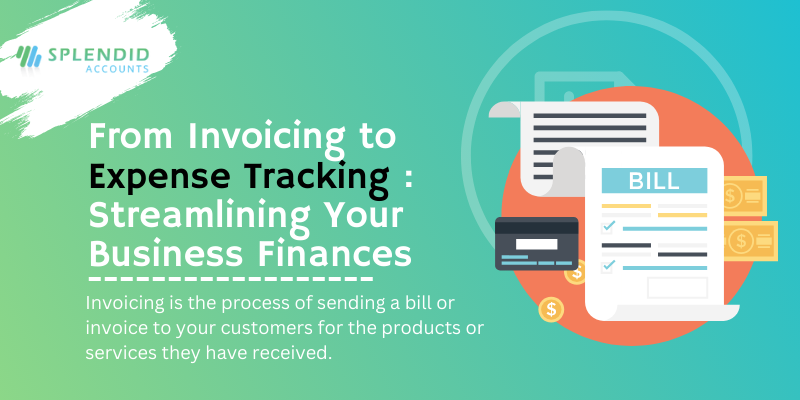
In the world of business money, two critical components often go hand in hand: invoicing and expense tracking. While invoicing ensures that you get paid for the goods or services you provide, expense tracking helps you keep tabs on where your money is going. In this article, we’ll talk about going from making bills to keeping track of what you spend, so you can make your business money work better.
1. Understanding Invoicing
Invoicing is the process of sending a bill or invoice to your customers for the products or services they have received. It serves as a formal request for payment and outlines the details of the transaction, including the quantity, price, terms of sale, and payment due date. Invoicing is essential for maintaining cash flow, tracking sales, and managing accounts receivable.
2. Importance of Timely Invoicing
Timely invoicing is crucial for ensuring prompt payment and maintaining healthy cash flow. By sending invoices promptly after delivering goods or services, you demonstrate professionalism and prompt your customers to settle their bills in a timely manner. Delayed invoicing can lead to cash flow shortages, late payments, and strained relationships with customers.
3. Streamlining the Invoicing Process
To streamline the invoicing process, consider adopting invoicing software or cloud-based invoicing platforms. These tools automate invoicing tasks, generate professional-looking invoices, and provide features such as recurring billing, payment reminders, and online payment options. Additionally, integrating your invoicing software with your accounting system can simplify reconciliation and financial reporting.
4. Transitioning to Expense Tracking
Expense tracking involves monitoring and recording all business-related expenses, including purchases, overhead costs, and operational expenses. It helps businesses track their spending, identify cost-saving opportunities, and ensure compliance with tax regulations. Effective expense tracking provides insights into where your money is being spent and allows you to make informed financial decisions.
5. Importance of Accurate Expense Tracking
Accurate expense tracking is essential for maintaining financial health and making strategic business decisions. By meticulously documenting expenses, you gain visibility into your company’s spending patterns, identify areas of overspending or inefficiency, and allocate resources more effectively. Moreover, accurate expense records are vital for tax compliance and audit readiness.
6. Leveraging Technology for Expense Tracking
Similar to invoicing, technology plays a pivotal role in streamlining expense tracking processes. Expense tracking software and mobile apps allow businesses to capture expenses on the go, categorize transactions, and upload receipts digitally. These tools offer features such as real-time expense reporting, automatic expense categorization, and integration with accounting software for seamless reconciliation.
7. Integrating Invoicing and Expense Tracking
To optimize your business finances, consider integrating your invoicing and expense tracking systems. By synchronizing data between the two systems, you can gain a comprehensive view of your financial transactions, from sales revenue to operating expenses. This integration streamlines financial management processes, improves accuracy, and facilitates better decision-making.
8. Implementing Best Practices
To maximize the effectiveness of your invoicing and expense tracking efforts, consider implementing the following best practices:
- Standardize invoicing templates and formats for consistency.
- Set up automated payment reminders to reduce late payments.
- Establish expense policies and approval workflows to control spending.
- Regularly review and analyze expense reports to identify cost-saving opportunities.
- Train employees on proper expense tracking procedures and use of expense tracking tools.
Conclusion
From invoicing to expense tracking, effective financial management is essential for the success of any business. By streamlining your invoicing and expense tracking processes and leveraging technology solutions, you can optimize cash flow, gain insights into your financial performance, and make informed business decisions. By integrating these two critical components of business finance, you can achieve greater efficiency, accuracy, and control over your finances.
